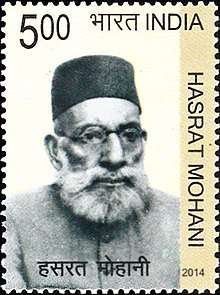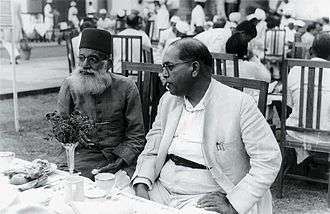Hasrat Mohani
Syed Fazl-ul-Hasan (14 October 1875 – 13 May 1951), known by his pen-name Hasrat Mohani, was an Indian activist, freedom Fighter in the Indian independence movement and a noted poet of the Urdu language.[1] He coined the notable slogan Inquilab Zindabad (translation of "Long live the revolution!") in 1921.[2][3] Together with Swami Kumaranand, he is regarded as the first person to demand complete independence for India in 1921 at the Ahmedabad Session of the Indian National Congress.[4][3][5]
Hasrat Mohani | |
|---|---|
 Mohani on a 2014 stamp of India | |
| Born | Syed Fazl-ul-Hasan 14 October 1875 Mohan, North-West Provinces, British India |
| Died | 13 May 1951 (aged 75) Lucknow, Uttar Pradesh, India |
| Pen name | Hasrat Mohani |
| Occupation | Poet, Freedom fighter, Politician, Philosopher |
| Nationality | Indian |
| Period | 20th Century |
| Genre | Ghazal |
| Subject | Love and philosophy |
| Literary movement | Indian independence movement |
Short biography
He was born in 1875 as Syed Fazl-ul-Hasan at Mohan, a town in the Unnao district of United Provinces in British India. Hasrat was his pen name (takhallus) that he used in his Urdu poetry whereas his last name 'Mohani' refers to Mohan, his birthplace.[3]
His ancestors migrated from Nishapur, in Iran.[6][7]
Hasrat Mohani championed the freedom struggle. He also wrote verses expressing deep love for Krishna,[8] and often went to Mathura to celebrate Krishna Janmashtami.[1]
He studied at Muhammadan Anglo-Oriental College which later became Aligarh Muslim University, where some of his colleagues were Maulana Mohammad Ali Jauhar and Maulana Shaukat Ali. His teachers in poetry were Tasleem Lucknawi and Naseem Dehlvi. To honor him, Aligarh Muslim University has a hostel named after him[1]
Academic
A few of his books are Kulliyat-e-Hasrat Mohani (Collection of Hasrat Mohani's poetry), Sharh-e-Kalam-e-Ghalib (Explanation of Ghalib's poetry), Nukaat-e-Sukhan ( Important aspects of poetry), Mushahidaat-e-Zindaan (Observations in Prison), etc. A very popular ghazal Chupke Chupke Raat Din sung by Ghulam Ali and 'Ghazal King' Jagjit Singh was penned by him. He was also featured in the film Nikaah (1982). The famous slogan of Indian freedom fighters Inquilab Zindabad was coined by Mohani in 1921.[9][10][3]
Political
Mohani was a member of the Indian National Congress for many years and also joined the All India Muslim League, serving as its president in 1919. Mohani supported the leadership of Muhammad Ali Jinnah but chose to remain in India after the Partition of India in 1947. He became a member of the Constituent Assembly of India which drafted the Indian Constitution. He saw hypocrisy towards Muslim minorities in the constitution. So he never signed it. In order to represent the remaining Indian Muslims on different platforms, Hasrat Mohani chose to live in India rather than migrate to Pakistan.[4]
He never accepted Government allowances or stayed at official residences. Instead he stayed in mosques and used to go to the Parliament in a shared tonga. He was a religious practicing Muslim and led a simple life. Maulana had gone for Hajj (pilgrimage to Mecca, Saudi Arabia) several times. He used to travel in third class railroad cars. When asked why he travelled third class, he quipped because there is no fourth class.[1][4]
Struggle for Indian independence

Mohani participated in the struggle for Indian Independence (end of British Raj); and was jailed in 1903 for many years by British authorities. At that time political prisoners were treated like common criminals and forced to do manual labor.[1]
In 1904, he joined the Indian National Congress Party.[1] He was the first person in Indian History who demanded 'Complete Independence' (Azadi-e-Kaamil) in 1921 as he presided over an annual session of All-India Muslim League. In December 1929, his campaign for 'complete independence' resulted in the shape of Indian National Congress session in Lahore.[10]
After complete independence from the British rule, Maulana Hasrat Mohani wanted a confederal set up on the pattern of Union of Soviet Socialist Republic (USSR). He wanted to see a confederal constitution in India after freedom from the British rule. His proposal had six federations: 1. East Pakistan; 2. West Pakistan; 3. Central India; 4. South-eastern India; 5. South-western India; and 6. Hyderabad Deccan.[10]
Communist movement
He was among the founders of the Communist Party of India at Kanpur in 1925.[4] He was also imprisoned for promoting anti-British ideas, especially for publishing an article against British policies in Egypt, in his magazine 'Urdu-e-Mualla'. Afterwards, unlike some Urdu poets like Josh Malihabadi and many Muslim leaders, he chose to live in India rather than move to Pakistan after independence (1947) to represent left over Indian Muslims on various platforms. In recognition for his efforts, he was made a member of the constituent assembly which drafted the Indian constitution. But unlike other members, he never signed it.[4]
Death and legacy
Maulana Hasrat Mohani died on 13 May 1951 in Lucknow, India.[4][3]
Hasrat Mohani Memorial Society was founded by Maulana Nusrat Mohani in 1951. In Karachi, Sindh, Pakistan, Hasrat Mohani Memorial Library and Hall Trust, Karachi have been established by Hasrat Mohani Memorial Society. Every year, on his death anniversary, a memorial meeting is conducted by this Trust as well as many other organisations in India and Pakistan.[10] Also Hasrat Mohani Colony, at Korangi Town in Karachi, Sindh, Pakistan, was named after Maulana Hasrat Mohani. A famous road is named after him in the financial hub of Karachi.[4]
There is a Street Named Maulana Hasrat Mohani in Kadar Palace, Mumbra, Dist: Thane, Maharashtra.
Maulana Hasrat Mohani Hospital is situated in Chamanganj, Kanpur. There is also a road named Maulana Hasrat Mohani Street in Kanpur. Maulana Hasrat Mohani Gallery is situated at Bithoor Museum.
Hasrat Mohani Memorial Girls' Higher Secondary School in Metiabruz, Kolkata, India, is named after him. A hostel in Aligarh Muslim University is also named after him.[11]
Publications
- Urdu-e-Moalla (magazine)[1][4]
- Kulliyat-e-Hasrat Mohani (Collection of Hasrat Mohani's poetry) (Published in 1928 and 1943)[10]
- Sharh-e-Kalam-e-Ghalib (Explanation of Ghalib's poetry)
- Nukaat-e-Sukhan (Important aspects of poetry)
- Tazkira-tul-Shuara (Essays on the Poets)[10]
- Mushahidaat-e-Zindaan (Observations in the Prison)
See also
References
- "Chupke chupke raat din… (lyrics of Hasrat Mohani's famous ghazal, article also includes his profile)". The Hindu (newspaper). 29 August 2014. Retrieved 11 March 2019.
- The Illustrated Weekly of India. GoogleBooks. Published for the proprietors, Bennett, Coleman & Company, Limited, at the Times of India Press. October 1974. Retrieved 11 March 2019.
- "India remembers Maulana Hasrat Mohani who gave the revolutionary slogan 'Inquilab Zindabad'". Zee News. 2 January 2017. Retrieved 12 March 2019.
- "Profile: Maulana Hasrat Mohani". The Milli Gazette (newspaper). 6 October 2012. Retrieved 11 March 2019.
- "71 years of Independence: How Communists kept pestering the British throughout the freedom struggle". The Indian Express. 18 August 2017. Retrieved 12 March 2019.
- Gulam Ali Allana (1988) Muslim political thought through the ages: 1562–1947, Royal Book Company (1988), p. 215, ISBN 9694070910
- Avril Ann Powell (2013) Muslims and Missionaries in Pre-Mutiny India, Routledge, p. 181, ISBN 1138878855
- C.M. Naim The Maulana Who Loved Krishna Outlook India (magazine), Published 12 January 2012, Retrieved 12 March 2019
- Prashant H. Pandya (1 March 2014). Indian Philately Digest. Indian Philatelists' Forum. Retrieved 12 March 2019.
- "LITERACY NOTES: Hasrat Mohani – a unique poet & politician". Business Recorder. 18 June 2005. Archived from the original on 6 April 2018. Retrieved 10 March 2019.
- https://www.google.com/search?q=mohani+hostel+aligarh&oq=mohani+hostel+aligarh&aqs=chrome..69i57.10510j1j7&sourceid=chrome&ie=UTF-8
External links
| Wikimedia Commons has media related to Hasrat Mohani. |
